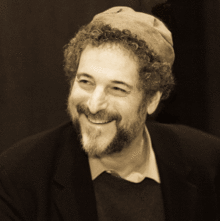Richard Kaplan
(1949 - 2021)
A close friend of Ashkenaz founder, David Nadel, Richard Kaplan was one of the first live performers at Ashkenaz. He was David’s best friend and co-founder of Tofu Records with David. Richard was a cantor, teacher, and ethnomusicologist. Performing professionally as a singer, songwriter, and pianist for over 40 years, his extensive concert repertoire of Jewish World Music included songs from Ashkenazic (European), Mizrachi (Middle Eastern), and Sephardic (Spanish/Andalusian) traditions, as well as original pieces, often based on ancient melodies and texts. Richard toured nationally and internationally giving workshops of Jewish World Sacred Music.
Richard Kaplan, the cantor who will be remembered for introducing many of the Mizrachi melodies sung in synagogues in the East Bay — and for what his cantorial colleague Linda Hirschhorn described as “that wonderful, throaty voice that was so tantalizing” — died on Sept. 21, his Hebrew birthday and the first day of Sukkot. He was 72.
Kaplan was physically tall and a huge presence, with a soulful voice and energy to match.
“More important than his music, even, was that he lived on a higher spiritual plane than most people,” said Temple Beth Abraham’s Rabbi Mark Bloom, who worked with Kaplan for nearly two decades. “That was evident in his davening. His kavanah [intention] was otherworldly. Musically, he was a real scholar. No one knew more about Middle Eastern music than he did.”
Though he served for 22 years at the Oakland Conservative synagogue, retiring in 2018 and becoming cantor emeritus, Kaplan had found a home in the Jewish Renewal movement, serving as an emeritus member of the Spiritual Advisory Council of Aleph, the Alliance for Jewish Renewal, where he received his cantorial smicha (ordination) from Rabbi Zalman Schachter-Shalomi. He studied Hasidic music extensively over many years with Reb Zalman, as he was known, who joked that he was “downloading” his own tremendous knowledge of Eastern European spiritual music into Kaplan.
According to his biography on his website, Kaplan was raised in a musical family in Los Angeles and started singing professionally at 14. He developed an early appreciation of world music, though that term had not yet been coined.
His bachelor’s degree from UCLA was in ethnomusicology, and he obtained a master’s degree from UC Berkeley in musicology. After working as a jazz pianist in Manhattan, Kaplan returned to California and taught music history in numerous colleges. He also immersed himself in, and taught, martial arts.
Reintroduced to Judaism through a friend, he decided to study the cantorial tradition with Conservative Cantor Marc Dinkin. In 1997, the same year Kaplan began at Beth Abraham, he also co-founded the Shir HaShirim (Song of Songs) Minyan with Renewal Rabbi Michael Ziegler. It was held monthly at the JCC East Bay for over 20 years, with Kaplan manning the grand piano.
Friend Joshua Horowitz, a musician and founder of the klezmer trio Veretski Pass, often played at the Shir HaShirim Minyan.
“I loved Richard’s openness, both musically and personally,” said Horowitz. Calling the minyan “hippie Shabbos,” Horowitz described the experience as having “a lot of swaying and people closing their eyes and me as a musician following Richard’s lead. His tastes were so eclectic. At these Shabboses we’d play Middle Eastern melodies, Coltrane and Miles Davis, as well as Shlomo Carlebach.”
“Our goal was to make the service as accessible as possible,” Kaplan said in a 2000 J. interview. “We try to find a balance between prayer, singing, meditation and dance.”
“Richard was an inspirational light, and a soulful and big-hearted, jazzy presence in our community,” said Laura Sheppard, another founding minyan member.
Kaplan recorded several CDs of original music, and his rendition of “Niggun of the Alter Rebbe” was played on the TV series “House, M.D.”
Hirschhorn said she had deep respect and admiration for what Kaplan brought to the community, “all of these amazing melodies from Mizrachi tradition that I had never heard before, and how he did that research. He was such a deep intellectual in his understanding of these musical roots and modalities and he brought them to our ears.”
Bloom recalled a few times when Mizrachi Jews attended Beth Abraham and would be moved to tears to hear Kaplan do a tune from their childhood.
A “raucous, rousing” song from Iraq, “Hallelu Avdei Adonai,” was perhaps Kaplan’s signature piece, according to Bloom, and continues to be a favorite at Beth Abraham, as well as other Renewal communities in the East Bay.
Bloom said, “We still do it without him, but not that well.”

